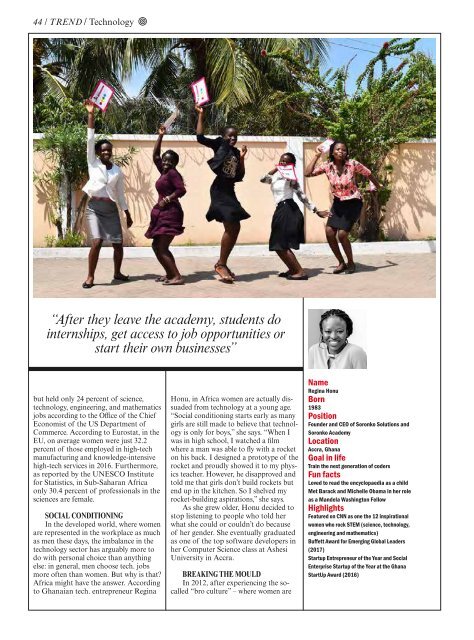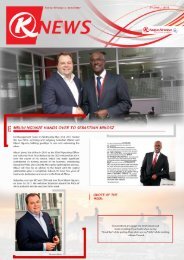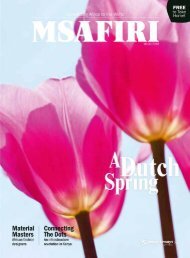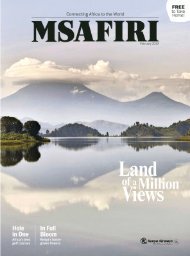Create successful ePaper yourself
Turn your PDF publications into a flip-book with our unique Google optimized e-Paper software.
44 / TREND / Technology<br />
TREND / 45<br />
“After they leave the academy, students do<br />
internships, get access to job opportunities or<br />
start their own businesses”<br />
but held only 24 percent of science,<br />
technology, engineering, and mathematics<br />
jobs according to the Office of the Chief<br />
Economist of the US Department of<br />
Commerce. According to Eurostat, in the<br />
EU, on average women were just 32.2<br />
percent of those employed in high-tech<br />
manufacturing and knowledge-intensive<br />
high-tech services in 2016. Furthermore,<br />
as reported by the UNESCO Institute<br />
for Statistics, in Sub-Saharan Africa<br />
only 30.4 percent of professionals in the<br />
sciences are female.<br />
SOCIAL CONDITIONING<br />
In the developed world, where women<br />
are represented in the workplace as much<br />
as men these days, the imbalance in the<br />
technology sector has arguably more to<br />
do with personal choice than anything<br />
else: in general, men choose tech. jobs<br />
more often than women. But why is that?<br />
Africa might have the answer. According<br />
to Ghanaian tech. entrepreneur Regina<br />
Honu, in Africa women are actually dissuaded<br />
from technology at a young age.<br />
“Social conditioning starts early as many<br />
girls are still made to believe that technology<br />
is only for boys,” she says. “When I<br />
was in high school, I watched a film<br />
where a man was able to fly with a rocket<br />
on his back. I designed a prototype of the<br />
rocket and proudly showed it to my physics<br />
teacher. However, he disapproved and<br />
told me that girls don’t build rockets but<br />
end up in the kitchen. So I shelved my<br />
rocket-building aspirations,” she says.<br />
As she grew older, Honu decided to<br />
stop listening to people who told her<br />
what she could or couldn’t do because<br />
of her gender. She eventually graduated<br />
as one of the top software developers in<br />
her Computer Science class at Ashesi<br />
University in Accra.<br />
BREAKING THE MOULD<br />
In 2012, after experiencing the socalled<br />
“bro culture” – where women are<br />
Name<br />
Regina Honu<br />
Born<br />
1983<br />
Position<br />
Founder and CEO of Soronko Solutions and<br />
Soronko Academy<br />
Location<br />
Accra, Ghana<br />
Goal in life<br />
Train the next generation of coders<br />
Fun facts<br />
Loved to read the encyclopaedia as a child<br />
Met Barack and Michelle Obama in her role<br />
as a Mandela Washington Fellow<br />
Highlights<br />
Featured on CNN as one the 12 inspirational<br />
women who rock STEM (science, technology,<br />
engineering and mathematics)<br />
Buffett Award for Emerging Global Leaders<br />
(2017)<br />
Startup Entrepreneur of the Year and Social<br />
Enterprise Startup of the Year at the Ghana<br />
StartUp Award (2016)<br />
left out, or are even sexually harassed –<br />
while working as the only woman in the<br />
IT department of a major international<br />
bank, Honu decided to leave her wellpaid<br />
job and follow her dream. She soon<br />
founded her own software development<br />
firm, Soronko Solutions, which now<br />
builds websites and e-commerce portals<br />
for over 30 businesses in Accra. Having<br />
succeeded herself, Honu decided to<br />
encourage young women to pursue a<br />
career in technology by founding Tech<br />
Needs Girls, a mentorship initiative that<br />
teaches girls aged 6-18 how to code and<br />
develop mobile and web applications.<br />
The programme has already trained<br />
over 5,000 women and girls in 8 regions<br />
in Ghana, and recently expanded to<br />
neighbouring Burkina Faso, where 685<br />
girls have been trained. Since a lack of<br />
resources was a stumbling block for<br />
these girls to continue their development<br />
after completing the programme, Honu<br />
decided to found the Soronko Academy,<br />
which is the first coding and humancentred<br />
design academy in West Africa.<br />
After they leave the academy, students do<br />
internships, get access to job opportunities<br />
or start their own businesses. “Early<br />
training of young girls, changing their<br />
mindsets, creating visible role models<br />
and getting more female STEM teachers<br />
would really encourage more girls to get<br />
involved in technology,” says Honu.<br />
THROUGH THE MOUNTAIN<br />
“Although more African women are<br />
entering the tech. industry, a large number<br />
of them are having to leave their jobs<br />
after a few years as they can’t break the<br />
glass ceiling in an industry that’s still<br />
largely male-dominated,” says Ethel<br />
Cofie, a leading tech. entrepreneur from<br />
Ghana. Cofie founded her own software<br />
company, EDEL Technology Consulting,<br />
which was named “IT Consulting Firm<br />
of the Year” at the 2016 Ghana IT and<br />
Telecom Awards. Cofie, who is recognised<br />
as one of the top five women influencing<br />
technology in Africa, is also the founder<br />
of Women in Tech Africa, which is now<br />
the largest Pan-African network of<br />
women in technology, with membership<br />
in over 30 African countries.<br />
Joanitah Nalubega from Uganda is<br />
another successful entrepreneur in the<br />
technology space. She cofounded Drug-<br />
Dash, a mobile and web system that<br />
supports drug-supply-chain managers at<br />
Ugandan health centres with real-time<br />
data on medicine consumption, demand<br />
and supply in order to maintain stock<br />
levels. DrugDash does this by redistributing<br />
surplus drugs, while preventing waste<br />
due to expiry, and allowing for accurate<br />
resource planning. Nalubega is a qualified<br />
industrial chemist, who has a passion for<br />
finding solutions for the African health<br />
sector by using technology. She also<br />
works with AfriGal Technologies – a team<br />
of young women – to design and develop<br />
an alternative (mobile) diagnostics tool<br />
for sickle cell anemia. “No industry can<br />
effectively transform life for the better<br />
when half of the world’s population is<br />
not adequately represented in the workforce,”<br />
says Nalubega, who is the Next<br />
Einstein Forum Ambassador to Uganda<br />
(2017-2019). She adds that women typically<br />
bring a different perspective to the<br />
table, which results in solutions that are<br />
relevant and user-friendly for women<br />
and men.<br />
In Kenya, Ciiru Waweru Waithaka<br />
started educational programme Kidz Go<br />
Tech, which – in partnership with Safaricom,<br />
Kenya’s biggest telecoms company<br />
– organises monthly practical classes<br />
with science-based experiments that<br />
motivate children (particularly girls)<br />
aged 5-13 to embrace technology and<br />
use it to solve everyday problems.<br />
Michelle Obama acclaimed the project<br />
at The United State of Women Summit.<br />
“I truly believe that the next Mark<br />
Zuckerberg can be a 12-year-old<br />
Ghanaian girl,” says Honu. Given the<br />
manner in which female African tech.<br />
entrepreneurs have taken the initiative in<br />
recent years, you wouldn’t want to bet<br />
against it.<br />
Name<br />
Ciiru Waweru Waithaka<br />
Born<br />
1975<br />
Position<br />
Founder and CEO of Funkidz, which runs<br />
Kidz Go Tech<br />
Location<br />
Nairobi, Kenya<br />
Goal in life<br />
Transform Africa into a continent of male<br />
and female industrialists<br />
Fun facts<br />
Likes skydiving<br />
Designed the first educational<br />
experimental robot in Africa and hopes to<br />
launch it next year<br />
Highlights<br />
Women 4 Tech Award at the Glomo Awards<br />
(2017)<br />
In 2016, she got a special mention and<br />
commendation from Michelle Obama for<br />
being part of a positive education change for<br />
children in Africa in the area of technology<br />
and manufacturing.<br />
“I truly believe that the next Mark Zuckerberg<br />
can be a 12-year-old Ghanaian girl”<br />
Jeroen van Loon

















